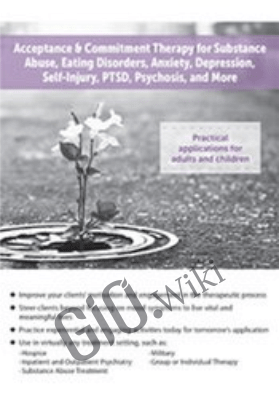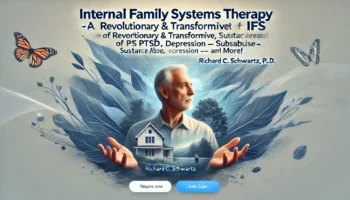Acceptance and Commitment Therapy for Substance Abuse, Eating Disorders, Anxiety, Depression, Self-Injury, PTSD, Psychosis, and More – Sydney Kroll
Acceptance and Commitment Therapy for Substance Abuse, Eating Disorders, Anxiety, Depression, Self-Injury, PTSD, Psychosis, and More – Sydney Kroll Downloa…
Overview
Discover the Best Learning with Acceptance and Commitment Therapy for Substance Abuse, Eating Disorders, Anxiety, Depression, Self-Injury, PTSD, Psychosis, and More – Sydney Kroll
WisMentor is your ultimate destination for online learning. Explore "Acceptance and Commitment Therapy for Substance Abuse, Eating Disorders, Anxiety, Depression, Self-Injury, PTSD, Psychosis, and More – Sydney Kroll" by top authors and instructors, designed to transform your skills and career. Start now and unlock your potential!
Salepage check: Acceptance and Commitment Therapy for Substance Abuse, Eating Disorders, Anxiety, Depression, Self-Injury, PTSD, Psychosis, and More
Author: Sydney Kroll

Acceptance and Commitment Therapy (ACT) is a unique and innovative approach that helps clients to fundamentally change their relationship with their thoughts and feelings; to live in the present moment; to stop reacting and start responding; and to allow their values to guide them in a more rich and meaningful life. In ACT, clients utilize skills in mindfulness to accept the painful aspects of their lives while at the same time reducing the experiential avoidance that causes suffering. In other words, “Pain is inevitable. Suffering is optional.” Move your clients toward focusing on identifying what matters in their lives and taking actions in service of those values.
In this recording Sydney Kroll, PsyD, shares an introduction to the research and theory behind ACT so you can clearly articulate the empirical evidence for this model. Experiential and engaging activities are used throughout the course to illustrate specific techniques and concepts. Dr. Kroll shows you how to apply these strategies to virtually any client population. Walk away with the skills and tangible resources to use immediately in your practice for better client outcomes and a greater sense of purpose as a clinician.
- Describe the theoretical models underlying ACT, including relational frame theory and mindfulness-based interventions as they relate to case conceptualization
- Use skills in mindfulness to accept the painful aspects of clients’ lives while at the same time reducing the experiential avoidance that causes suffering in clients
- Show how the lack of “psychological flexibility” contributes to at client’s suffering
- Analyze the six core processes of ACT and identify specific clinical interventions for each
- Articulate the application of the six core process of ACT in unique clinical contexts
- Identify assessment measures and strategies to evaluate the effectiveness of ACT as a therapeutic approach
THE EMPIRICAL EVIDENCE
- Relational frame theory (RFT)
- Cognitive psychology
- Third wave of behavioral interventions
- Supporting evidence
- Transdiagnostic nature of ACT
PSYCHOLOGICAL FLEXIBILITY
- Hexaflex Model
- Paradigm shift
PAIN VS. SUFFERING
- Avoidance
- Creative hopelessness
- What’s the goal?
THE SIX CORE PROCESSES
- Mindfulness
- Cognitive defusion
- Acceptance
- Self-as-concept
- Values
- Committed actions
INTERVENTIONS
- Practicing mindfulness (traditional and innovative strategies)
- Teaching clients to get out of their minds
- Presenting acceptance in a way people will accept
- Exploring observing self
- Values exploration
- Making committed actions in service of values
APPLICATION ISSUES
- Individual therapy
- Group therapy
- Inpatient
- Behavioral health settings
- ACT and psychopharmacology issues
RESOURCES FOR FURTHER TRAINING
- Collaboration and support
- Formal trainings
- Applying ACT in your unique settings
About Acceptance and Commitment Therapy for Substance Abuse, Eating Disorders, Anxiety, Depression, Self-Injury, PTSD, Psychosis, and More – Sydney Kroll and Our Expert Authors
Acceptance and Commitment Therapy for Substance Abuse, Eating Disorders, Anxiety, Depression, Self-Injury, PTSD, Psychosis, and More – Sydney Kroll is part of our extensive collection of over 70,000 premium courses at WisMentor. Created by renowned authors and industry leaders, this course is tailored to provide cutting-edge knowledge and actionable insights.
Why Choose WisMentor?
- 🌟 Access courses from world-renowned authors.
- 📚 Wide range of topics to suit your professional and personal growth needs.
- 💼 Lifetime access and flexible learning options.
Key Features of Acceptance and Commitment Therapy for Substance Abuse, Eating Disorders, Anxiety, Depression, Self-Injury, PTSD, Psychosis, and More – Sydney Kroll:
- ✅ Comprehensive content covering essential topics.
- ✅ Evidence-based methodologies and practical examples.
- ✅ Learn at your own pace with expert guidance.
How to Access Your Course?
Getting started is easy:
- 📩 Receive an instant download link via email.
- 🌐 Access your course anytime through your account dashboard.
- 📱 Compatible with all devices for a seamless experience.
Need Help?
Our dedicated support team is here to assist you. Visit our Contact Us page or reach out via email for any queries or assistance.
More from Our Collection:
Don’t miss the opportunity to explore more courses from top authors and enrich your learning journey at WisMentor. Find your next course now and take your skills to the next level.


